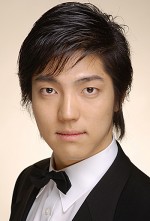Title
Central to every great vocal recital is a great collaboration. In celebration of the synergy between singers and their pianists, two teams of Juilliard artists are granted debut recitals at Lincoln Center’s Alice Tully Hall each spring, with this year’s taking place on March 20. Selected by a rigorous and impartial audition process, these performers will share programs of their own choosing at an event which has, since its inception more than a decade ago, come to be regarded as one of the highlights of the Juilliard vocal arts calendar. This year’s winning teams are baritone Takaoki Onishi and pianist Nozomi Marusawa, and tenor Kyle Bielfield and pianist Lachlan Glen.
Body
Selection for inclusion on the program is highly competitive and very coveted. Students must first be nominated by their teachers; these nominations are then passed through the Vocal Arts performance activities panel, which determines which of the nominees are ready for the audition. At the end of the process, 10 to 15 students—who may be in any degree program offered by the School—may audition in front of a panel of strangers.
As Vocal Arts’ artistic director Brian Zeger explained in a recent conversation with The Journal, “We always have an outside panel. We get some very talented judges from the field—normally, a singer, a pianist, and someone from the music business,” he said. “All the singers are strangers to them; they have no idea of what degree program they are in or who they study with, so they get a truly independent perception.”
However, the singers are not judged on talent alone—or as individuals. Teams are “judged as a duo, and also by what they’re offering. So it becomes a very valuable educational exercise in how to find repertoire that really suits them, expresses who they are, and is convincing,” Zeger said.
First-year master’s student Takaoki Onishi was the first winner of the Juilliard Prize from the International Foundation for Arts and Culture, which Japanese philanthropist Haruhisa Handa donated to fully fund a promising Japanese student’s studies. Once Onishi arrived at Juilliard in September, he was cast in Peter Maxwell Davies’s Kommilitonen!, which had its U.S. premiere here in November.
Onishi and his pianist, Nozomi Marusawa, will present a varied program of songs by Rachmaninoff and Ravel, as well as a set of Japanese art songs. Marusawa, a graduate of the Interlochen Arts Academy and the University of Michigan, is pursuing a master’s in collaborative piano. They are particularly excited about performing works that expresses their shared heritage. “These songs are very much a part of ourselves—and you rarely hear Japanese songs,” she said.
Miami-native Kyle Bielfield is, like Onishi, a first-year master’s student. A seasoned international soloist, Bielfield’s most recent performances include appearances in the New York Festival of Song (which took place at Juilliard in January) and Juilliard Opera’s production of Rossini’s La scala di seta last month.
Bielfield’s collaborator, Australian pianist Lachlan Glen, has established himself as an accomplished soloist, vocal coach, and conductor, garnering awards from the Dame Joan Sutherland Fund and the Ian Potter Cultural Trust, and having worked with artists such as Roger Bart and Lorin Maazel. Glen, also a first-year master’s student, will serve as apprentice coach at this summer’s Chautauqua Music Festival and has been appointed to the accompanying staff of the Internationale Meistersinger Akademie of Neumarkt, Germany.
The collaborative piano program is extremely demanding, according to both Glen and Marusawa. Collaborative pianists often have multiple private teachers (Glen has three, Marusawa two), and assume accompanying duties for many singers and instrumentalists. Glen estimates that in addition to his own lessons, he performs weekly in 10 to 15 other people’s lessons, each with different repertoire. In addition to all this playing, collaborative pianists are required to enroll in many of the courses taken by singers, including diction studies in English, French, German, and Russian, so they may enhance their vocal coaching skills. Though their program can technically be completed in two years, it is not uncommon for a collaborative pianist to choose to extend their studies into a third year.
Together, Bielfield and Glen will present a program of songs by Rachmaninoff, Strauss, Poulenc, and Rorem. The last two reflect two sides of the same coin; these celebrated song composers’ careers overlapped during the period Rorem spent in France (1949-57). Bielfield thought it would be appropriate to offer some American songs to celebrate his own roots. “Once I heard that Taka was doing Japanese songs, I thought ‘Why would I not do American art song?’ That’s something I really love and something I focus on,” he said.






